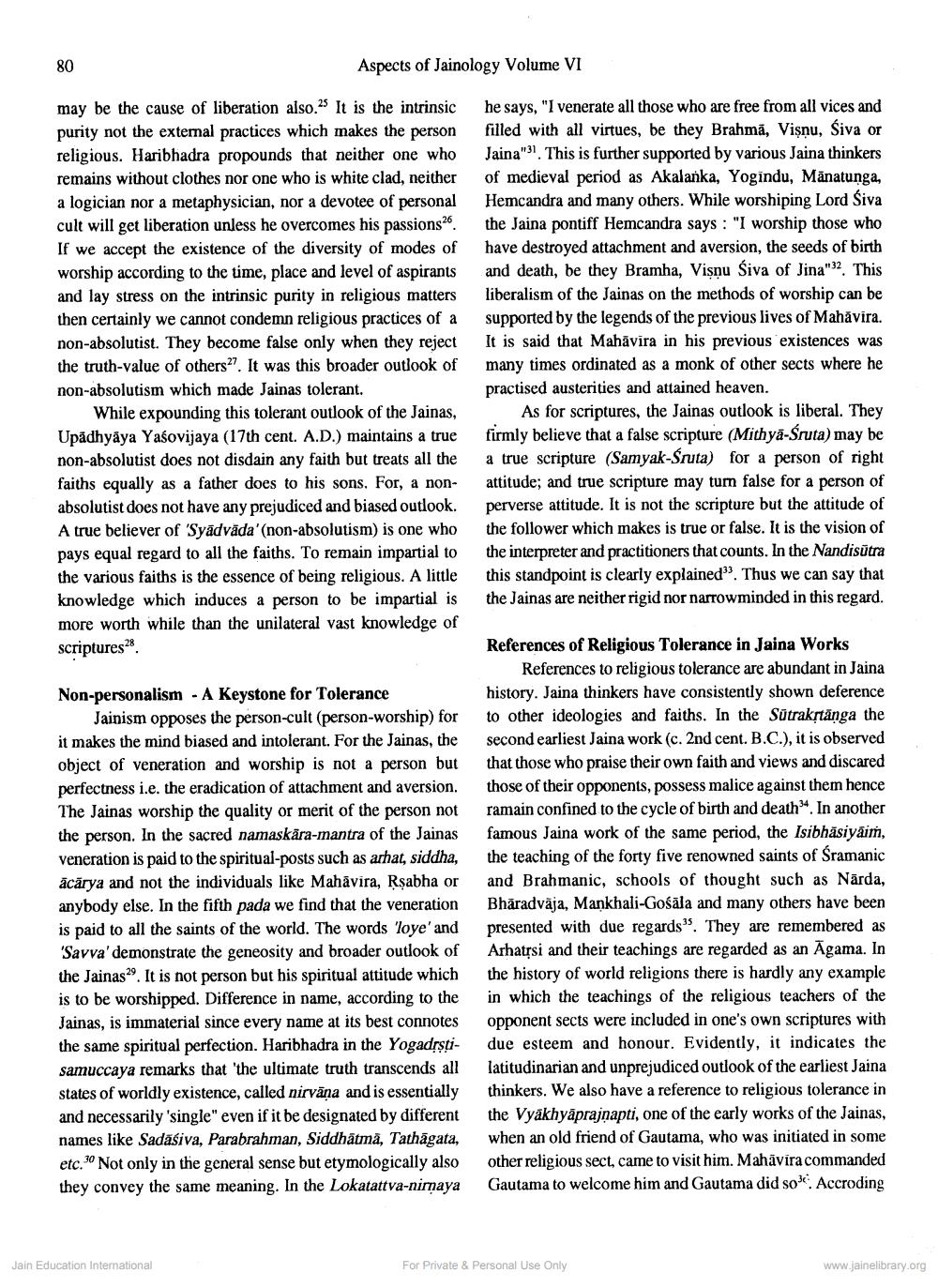________________
Aspects of Jainology Volume VI
may be the cause of liberation also.29 It is the intrinsic he says, "I venerate all those who are free from all vices and purity not the external practices which makes the person filled with all virtues, be they Brahmä, Vişnu, Siva or
ibhadra propounds that neither one who Jaina"31. This is further supported by various Jaina thinkers remains without clothes nor one who is white clad, neither of medieval period as Akalanka, Yogindu, Mänatunga, a logician nor a metaphysician, nor a devotee of personal Hemcandra and many others. While worshiping Lord Siva cult will get liberation unless he overcomes his passions26. the Jaina pontiff Hemcandra says: "I worship those who If we accept the existence of the diversity of modes of have destroyed attachment and aversion, the seeds of birth worship according to the time, place and level of aspirants and death, be they Bramha, Vişnu Śiva of Jina">2. This and lay stress on the intrinsic purity in religious matters liberalism of the Jainas on the methods of worship can be then certainly we cannot condemn religious practices of a supported by the legends of the previous lives of Mahāvira. non-absolutist. They become false only when they reject It is said that Mahāvīra in his previous existences was the truth-value of others27. It was this broader outlook of many times ordinated as a monk of other sects where he non-absolutism which made Jainas tolerant.
practised austerities and attained heaven. While expounding this tolerant outlook of the Jainas, As for scriptures, the Jainas outlook is liberal. They Upādhyāya Yaśovijaya (17th cent. A.D.) maintains a true firmly believe that a false scripture (Mithya-Śruta) may be non-absolutist does not disdain any faith but treats all the a true scripture (Samyak-Śruta) for a person of right faiths equally as a father does to his sons. For, a non- attitude; and true scripture may tum false for a person of absolutist does not have any prejudiced and biased outlook. perverse attitude. It is not the scripture but the attitude of A true believer of 'Syadvada' (non-absolutism) is one who the follower which makes is true or false. It is the vision of pays equal regard to all the faiths. To remain impartial to the interpreter and practitioners that counts. In the Nandisutra the various faiths is the essence of being religious. A little this standpoint is clearly explained". Thus we can say that knowledge which induces a person to be impartial is the Jainas are neither rigid nor narrowminded in this regard. more worth while than the unilateral vast knowledge of scriptures28
References of Religious Tolerance in Jaina Works
References to religious tolerance are abundant in Jaina Non-personalism - A Keystone for Tolerance
history. Jaina thinkers have consistently shown deference Jainism opposes the person-cult (person-worship) for to other ideologies and faiths. In the Sütrakstänga the it makes the mind biased and intolerant. For the Jainas, the second earliest Jaina work (c. 2nd cent. B.C.), it is observed object of veneration and worship is not a person but that those who praise their own faith and views and discared perfectness i.e. the eradication of attachment and aversion. those of their opponents, possess malice against them hence The Jainas worship the quality or merit of the person not ramain confined to the cycle of birth and death. In another the person. In the sacred namaskära-mantra of the Jainas famous Jaina work of the same period, the Isibhäsiyāim, veneration is paid to the spiritual-posts such as arhat, siddha, the teaching of the forty five renowned saints of Śramanic ācārya and not the individuals like Mahāvira, Rşabha orand Brahmanic, schools of thought such as Nārda, anybody else. In the fifth pada we find that the veneration Bhāradvāja, Mankhali-Gośāla and many others have been is paid to all the saints of the world. The words 'loye' and presented with due regards". They are remembered as
Savva' demonstrate the geneosity and broader outlook of Arhatçsi and their teachings are regarded as an Āgama. In the Jainas 29. It is not person but his spiritual attitude which the history of world religions there is hardly any example is to be worshipped. Difference in name, according to the in which the teachings of the religious teachers of the Jainas, is immaterial since every name at its best connotes opponent sects were included in one's own scriptures with the same spiritual perfection. Haribhadra in the Yogadrsti- due esteem and honour. Evidently, it indicates the samuccaya remarks that 'the ultimate truth transcends all latitudinarian and unprejudiced outlook of the earliest Jaina states of worldly existence, called nirvana and is essentially thinkers. We also have a reference to religious tolerance in and necessarily 'single" even if it be designated by different the Vyakhyaprajnapti, one of the early works of the Jainas, names like Sadasiva, Parabrahman, Siddhātmā, Tathāgata, when an old friend of Gautama, who was initiated in some etc." Not only in the general sense but etymologically also other religious sect, came to visit him. Mahävira commanded they convey the same meaning. In the Lokatattva-nirnaya Gautama to welcome him and Gautama did sok. Accroding
Jain Education International
For Private & Personal Use Only
www.jainelibrary.org




